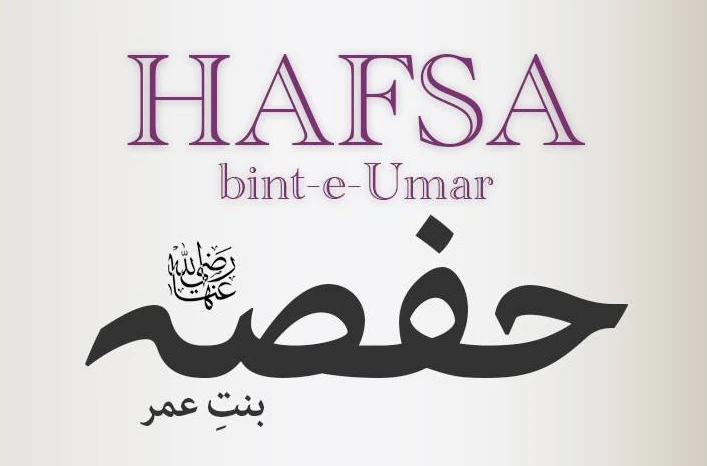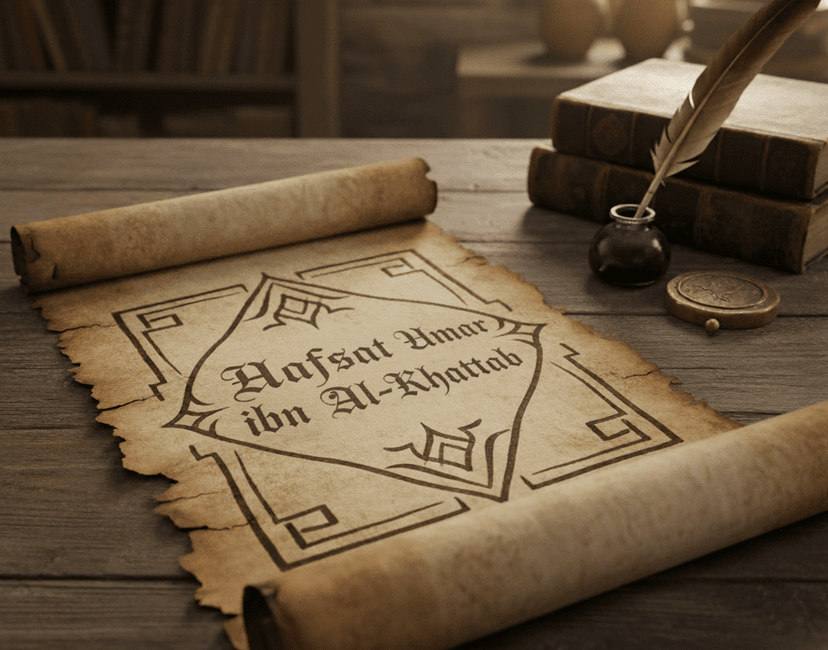Hafsah bint Umar ibn Al-Khattab is a distinguished figure in Islamic history known for her profound influence as a wife of the Prophet Muhammad and a daughter of the second Caliph, Umar ibn al-Khattab. Born around 605 CE, before the advent of Islam, Hafsah grew up in a household exemplifying strength, leadership, and dedication to faith, as her father was among the earliest and most respected leaders in the Muslim community.
Hafsah bint Umar ibn Al-Khattab

Hafsah was the eldest daughter of Umar ibn al-Khattab and Zaynab bint Maz’un. Her birth occurred before the Prophet’s mission, a time when the Quraysh tribe was constructing the Ka’bah in Mecca. From an early age, Hafsah embraced Islam and faced the persecution that early Muslims endured, shaping her with resilience and faith under pressure. Her upbringing under Umar, known for his justice and unyielding character, deeply influenced her personality and values.
Marriage and Role in the Prophet’s Household
Hafsah first married Khunays ibn Hudhafah, a devout early Muslim and companion of the Prophet Muhammad. Khunays participated in significant events such as the migration to Abyssinia and to Medina but passed away young following the Battle of Badr, leaving Hafsah a widow at approximately 20 years old. Following this loss, her father sought to find her a righteous spouse and proposed her marriage to prominent companions Abu Bakr and Uthman; both declined, leading to the Prophet Muhammad himself marrying Hafsah. This marriage not only cemented close ties between the Prophet and Umar but also symbolized unity within the nascent Muslim community.
Living in the Prophet’s household, Hafsah was known for her strong will and dedication to faith. She engaged deeply with the teachings of the Prophet, not only as a wife but also as a devoted student and transmitter of Islamic knowledge. Hafsah’s interactions with the Prophet set her apart as a key figure in understanding and preserving the religious traditions directly from the source.
Contributions to Islamic Scholarship and Preservation of the Qur’an
Hafsah bint Umar was an ardent follower of Islam and recognized for her religious devotion, including regular fasting and prayers. Aside from her piety, she had a sharp intellect and was an excellent orator, attributing to her respect within the early Muslim community. Importantly, she narrated several authentic hadiths, which have been vital to Islamic jurisprudence and historical understanding, reflecting her attentive memory and precision in preserving the Prophet’s sayings and actions.
One of Hafsah’s most significant legacies lies in her role as a custodian of the Qur’an. After the Prophet Muhammad’s death, many Qur’an memorizers were killed in battles, raising fears the Qur’an might be lost. Consequently, Caliph Abu Bakr commanded Zayd ibn Thabit to compile the Qur’an into a single manuscript. This first official mushaf was entrusted to Hafsah for safekeeping, highlighting the extraordinary trust placed in her care. Later, during the Caliphate of Uthman ibn Affan, Hafsah’s manuscript was used as the reference to standardize the copies of the Qur’an that were disseminated throughout the Muslim world. This critical role underscores her place as a guardian of Islam’s most sacred text.
Personality and Legacy
Hafsah was known for her firmness, directness, and strong personality traits reminiscent of her father Umar. She stood firmly for her beliefs and was respected for her diligence in worship, including fasting and night prayers. She remained active in guiding the Muslim community even after the Prophet’s passing, leveraging her knowledge and wisdom gained from years in the Prophet’s household.
Living through multiple caliphates—Abu Bakr, Umar, Uthman, and Ali—Hafsah’s legacy bridged the formative years of Islam’s early expansion. She passed away around 45 AH (circa 665 CE) and was buried in Jannat ul-Baqee, a cemetery in Medina for many of the Prophet’s family and companions.
FAQs
Who was Hafsah bint Umar ibn Al-Khattab?
Hafsah was the daughter of Umar ibn al-Khattab, the second Caliph, and the fourth wife of Prophet Muhammad. She is known for her religious devotion and for safeguarding the first compiled manuscript of the Qur’an.
What was Hafsah’s contribution to the Qur'an?
She was entrusted with the safekeeping of the first official compiled mushaf of the Qur’an during Abu Bakr’s caliphate. Her manuscript later became the basis for the standardized Qur’anic copies under Caliph Uthman.
How did Hafsah’s marriage to the Prophet Muhammad influence Islamic history?
Her marriage strengthened the bond between the Prophet and Umar ibn al-Khattab, symbolizing unity among early Muslims. It also placed Hafsah in a unique position to learn from and preserve the Prophet’s teachings.
What are some personality traits of Hafsah?
She was known for her strong will, directness, piety, intellectual sharpness, and dedication to prayer and fasting.
Where is Hafsah buried?
Hafsah bint Umar was buried in Jannat ul-Baqee cemetery in Medina, a resting place for many prominent figures from early Islamic history
Conclusion
Hafsah bint Umar ibn Al-Khattab’s life is a testament to strength, faith, and devotion. As a wife of the Prophet Muhammad and a daughter of one of Islam’s greatest leaders, she played a pivotal role in religious scholarship and the preservation of the Qur’an. Her story emphasizes that influence is not measured through public spectacle but through dedicated service to faith, community, and the enduring legacy of Islam’s sacred teachings. Hafsah serves as a role model of piety, resilience, and responsibility for Muslims around the world.

